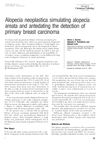Recurring Chemotherapy-Associated Alopecia Areata: Case Report and Literature Review
January 2003
in “
Pharmacotherapy: The Journal of Human Pharmacology and Drug Therapy
”

TLDR Chemotherapy may cause recurring hair loss due to an autoimmune response.
In 2003, a case report described a 52-year-old female cancer patient who developed recurring alopecia areata after chemotherapy with paclitaxel and carboplatin. This pattern of hair loss, which affected her eyebrows, eyelashes, and body hair, was not previously documented in cancer patients and appeared to be cyclic, coinciding with her chemotherapy cycles every 10 weeks. The report suggested an autoimmune mechanism, potentially linked to chemotherapy-induced changes in the follicular environment and the p53 protein, which could expose autoantigens leading to hair loss. Despite no family history of alopecia areata and normal lab results, the patient had a similar hair loss episode 25 years prior, possibly related to oral contraceptive use. The case underscores the importance for healthcare providers to consider autoimmune responses in unusual clinical presentations of alopecia in cancer patients.










